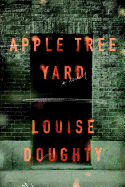
In Louise Doughty's Apple Tree Yard, a respected English geneticist and married mother of two looks back mid-trial at how she ended up in the dock at the Old Bailey. Yvonne Carmichael shares her legal peril with the first man who tempted her to cheat on her husband. He's an enigmatic government employee, also married, whose name and exact job title were happily mysterious to Yvonne until a traumatic trajectory transformed the nature of their dalliance from naughty to incriminating. Although Yvonne's husband remains in her corner, Doughty has her heroine address her interior ruminations to her lover.
The first intimation of high stakes occurs in the prologue/teaser, when we witness the crux of Yvonne's testimony without knowing the full gravity of her charges. The first chapter jumps back to the inauguration of her affair, and then proceeds chronologically through its aftermath. The last third of the novel reprises and resolves, for better or worse, the prologue's courtroom drama; these trial scenes are among the best in the book.
Several themes in Apple Tree Yard elevate its racy thriller profile. DNA struts throughout the text in hereditary and research guises, and two turns of the plot hinge upon forensic analysis. A defense barrister summarizes a study of primate altruism under stress that functions as a morality metaphor for several characters' choices. Finally, the novel raises the question of how guilt should be assigned. It's the reader, not the jury, who hears enough evidence to decide who is guilty, who is innocent and who is gallant. --Holloway McCandless, blogger at Litagogo: A Guide to Free Literary Podcasts

